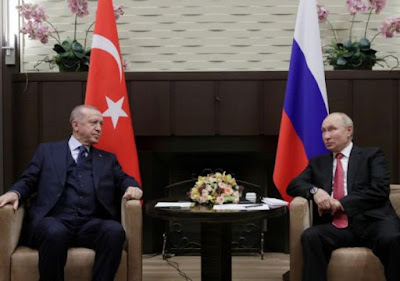Filenews 8 May 2022
The global economy is on fire, with fuel prices soaring and inflation galloping, with no strong safety net. Russia is affected by the sanctions, but it is also the USA that is paying a heavy cost, but above all the EU.
The war in Ukraine is taking place not only on the ground, where biblical disasters are taking place with a loss of 45% so far of its GDP, but also at sea. There Russia is changing, through structural changes, the EEZ and its rights, seeking to become sovereign, living in the region with Turkey.
Black Sea and "Blue Homeland"
According to Today's, Russian revisionist policy starts from Europe and through the Caucasus reaches the Middle East. It is being responded by the USA, the EU and NATO on the basis of an economic war and the construction of a new deterrent, fuelling the logic of the Russian crush in Ukraine, while at the same time threatening the creation of new fronts in Sweden and Finland if their accession to the North Atlantic Alliance goes ahead.
Among the structural changes that Russia expects to bring about include:
Firstly, the change of the Russian EEZ in the Black Sea, over which it expects to dominate and share it for the most part with Turkey, whose policy is based on the Blue Homeland. We have two revisionist strategies of countries that could go hand in hand instead of clashing. Hence the pendulum policy adopted by Erdogan.
The changes are imposed by force of arms and violate international law. With the occupation of Crimea, the EEZs in the region have already changed, and there will be further changes after the conquest of Mariupol. More will emerge if Odessa falls and Russia reaches Transnistria. In this case Moscow will create a strategic horseshoe from Sub-Yedneysteria to Belarus, through Mariupol and the Russian-speaking regions of Ukraine, trapping the country and leaving only one exit to its west.
A second outer arc is created from St. Petersburg to Kaliningrad, in the North Sea, which has two sides. One is defensive and the other is aggressive. It is also relevant to NATO's expansion in Finland and Sweden. An internal geostrategic arc is created from St. Petersburg to Belarus. The two arcs, one towards Kaliningrad and the other towards Belarus, form a geostrategic horseshoe, trapping the Baltic States.
The two maps, published by Simerini, illustrate how the EEZs in the Black Sea changed after Russia's acquisition of Crimea and how they will change if Moscow's strategic plans in the Ukraine war are implemented. Russia will dominate the Black Sea and will actually cohabit with Turkey and the Blue Homeland. And Ukraine is becoming an enclave...
Energy headache and interests
Secondly, the Middle East via the Caucasus. Control of the Black Sea not only puts an end to NATO's expansion towards Georgia, but also creates a basis for the consolidation of geopolitical interests in the Caucasus and from there to the Middle East and Asia, which is now Russia's energy and vital space. Why? Because that is where Moscow is turning to the sale of natural gas, because of the energy de-dependence that the EU has set as its policy.
It is a policy with obstacles, because, on the one hand, there are great dependencies, and, on the other, there is no time for a rapid reaction. The interests of the Member States differ. A common component must therefore be found. That is why last week there was no decision on the sixth package of sanctions and there was talk of a transitional period in terms of energy independence. Already, India and China are filling their warehouses with oil from Russia, paying at low prices.
Moscow's gains are already high, despite western sanctions, due to the skyrocketing prices, with no signs of their reining in on the horizon. Russian revenues have increased by 45% compared to the previous year. Russia is being placed in economic isolation from the West, but the rouble has recovered, at the same time as in the EU countries and the USA the indicators of inflation are rising dangerously, due to the increase in the price of fuel, the problem in the food chain, electricity and three other factors: A) The free market cannot function smoothly on the basis of the rules of supply and demand. B) There is profiteering. C) Russia's deterrent nuclear threats are exacerbating the situation, since this is psychological warfare and a sign of determination.
Nuclear threat
The use of nuclear weapons: 1) It is not recommended at this stage as a serious option, since Moscow controls the situation even if it has losses. 2) It means mutual cost and holocaust, which can be decided by Putin, if he loses the war and feels dishonoured. And that is what the West should be particularly careful about.
To know, that is, in the context of a rational game, to what extent it pulls the rope without weakening any deterrent ability. It is in this respect that the issue of NATO's expansion towards Sweden and Finland should be studied in depth. If ever, but also how it will be done. And what effects will arise. Will the benefit be greater than the cost? What kind of cost or benefit will be incurred?

